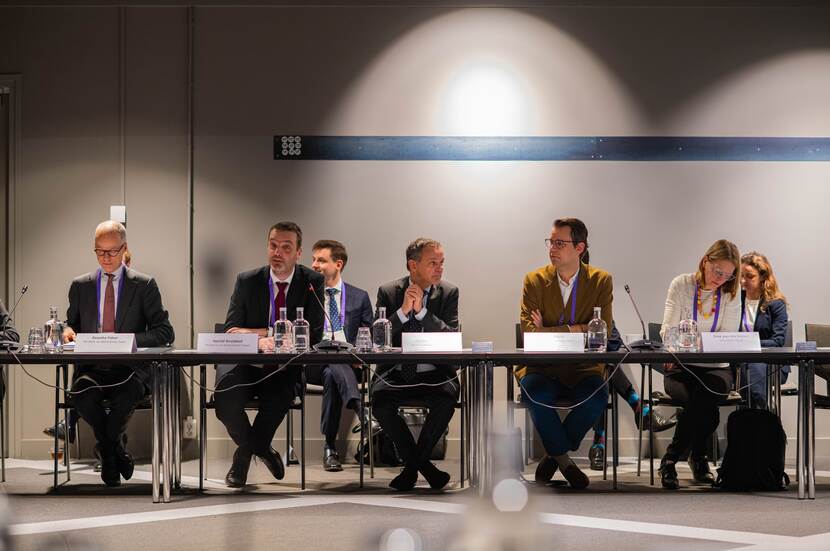‘Sanctions are only effective if they are complied with properly’
Weblogs
Sanctions are a powerful tool for exerting pressure on countries like Russia and Iran that violate international agreements. The aim is to combat injustice and change how such countries conduct themselves. But how do you ensure that sanctions are truly effective? Sanctions envoy Eeuwke Faber explains how, through international cooperation and enforcement, the Netherlands is putting sanctions policy into practice.

The sanctions envoy was appointed to help the Netherlands address the increasingly complex challenges that arise in relation to sanctions. His work has two main goals: ensuring that sanctions are properly complied with and helping develop new, more effective sanctions across Europe.
A key event in this respect will be the upcoming sanctions conference, at which Dutch companies and enforcement agencies will join international partners to share experiences and strengthen sanctions compliance.
Why has the Netherlands appointed a sanctions envoy?
‘Since Russia launched its war against Ukraine, the number of sanctions has increased significantly, as has their impact. Many more individuals, companies and sectors are now on European sanctions lists, and these measures are deeply affecting the Russian economy. These sanctions also have a more direct effect than before on Dutch companies and citizens. That’s why the Ministry of Foreign Affairs has appointed a sanctions envoy, alongside a dedicated sanctions policy unit.’
Isn’t this more of a matter for individual countries?
‘Ensuring compliance with sanctions is indeed primarily the responsibility of individual countries. So it may seem remarkable that the Ministry of Foreign Affairs is playing this role. We are involved because it’s crucial that sanctions are properly complied with. Only then will they have a real impact on countries like Russia, Iran and North Korea. Each EU member state is responsible for enforcing European sanctions within its borders. But sanctions are more effective when member states work together closely and support one another.’
'All countries must enforce sanctions, but not all countries have an equally large role to play in ensuring their effectiveness.'
Are you only as strong as the weakest link?
‘Yes, but what the weakest link is depends on the situation. All countries must enforce sanctions, but not all countries have an equally large role to play in ensuring their effectiveness. For instance, a country with no major ports or without a sizable financial sector has less impact on compliance. Countries that play a key role in the global economy, like the Netherlands, need to ensure their systems are robust. If they don’t, the sanctions will lose much of their effectiveness.
That’s why the Netherlands wants to enhance sanctions compliance. This can only be achieved through strong cooperation between businesses, supervisory authorities and the government. By sharing experiences and best practices, we can learn what works and what doesn’t.’
Which countries are currently sanctioned and why?
‘Russia tops the list, mainly because of the war in Ukraine and the threat posed to European security. Iran is also the focus of a lot of attention, partly due to its cooperation with Russia, such as its supply of drones and missiles. North Korea remains heavily sanctioned because of its nuclear programme. Other countries, like Venezuela, are on the sanctions list due to human rights violations or election fraud.
In addition to sanctions targeting specific countries, there are broader thematic sanctions too, such as those related to human rights. A good example is the EU’s global human rights sanctions regime, which targets human rights violators worldwide, regardless of where they are based. This initiative has been in place for a few years now and isn’t tied to any specific country.’
'Sanctions cannot end a war on their own. They must always be part of a larger set of measures.’
How effective are these sanctions?
‘That’s the critical question. Sanctions do work, but they must be seen as part of a broader policy effort. For example, by targeting the state’s economy and revenues, sanctions are intended to make it harder for Russia to wage war.
Sanctions have made it more difficult and expensive for Russia to obtain critical goods. Whereas it used to be easy for Russia to purchase chips and other technology from the West, now the country has to resort to indirect methods of acquiring inferior items. This costs more time and money, and creates shortages.
Sanctions also reduce Russia’s income. As a result, a growing share of the Russian government budget is being diverted to the war effort, leaving the domestic economy in increasing trouble. Sanctions make it harder for Russia to produce weapons and import high-tech products. This demonstrates that sanctions have an impact, even though they cannot end a war on their own. They must always be part of a larger set of measures.’

And what about the shadow fleet?
‘Tackling sanctions evasion is very important. Russia is indeed trying to circumvent oil sanctions using old, often poorly insured ships. We’ve therefore introduced sanctions targeting this Russian shadow fleet. The UK and the US are doing the same, and these measures are having an effect.’
What is the Netherlands doing to enforce sanctions?
‘In the Netherlands we’re taking significant steps to ensure sanctions are properly complied with. Agencies such as the Fiscal Information and Investigation Service (FIOD), the Customs Administration and financial supervisory authorities have increased their capacity to detect violations. We’ve also strengthened coordination. These organisations now work together more closely, enabling faster information sharing and earlier detection of evasion attempts.
We’re also modernising our legislation. The 1977 Sanctions Act is being replaced with new legislation giving the government more tools to address violations. An important improvement is the central reporting office on sanctions compliance, which will consolidate all reports in one place. This will help us identify trends more quickly and respond effectively. It will also make compliance easier for businesses.’
Do you work with sanctions envoys from other EU countries?
‘Yes, on a regular basis. All sanctions envoys from EU member states meet in Brussels to exchange experiences and ideas. There’s also a special EU Sanctions Envoy, David O’Sullivan, who discusses sanctions evasion with third countries. He travels to places like Kazakhstan, Türkiye and China to discuss sanctions strategies and address gaps in enforcement.
In addition to these Brussels meetings, I visit the relevant authorities in other countries, both in Europe and worldwide. We discuss how they enforce sanctions, the evasion patterns they observe, and the lessons that we can learn from each other. This ensures sanctions don’t just exist on paper but are truly effective in practice.’